
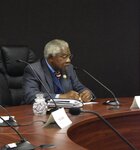
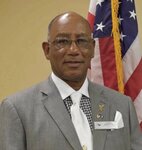
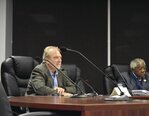
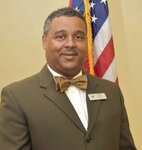
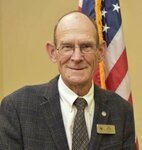
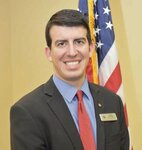
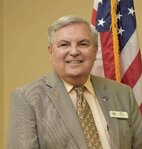
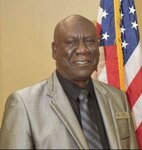
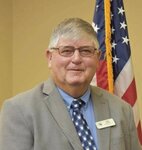
Questions were asked and some were answered when Barnwell County Council met with Senator Brad Hutto and Representative Lonnie Hosey at the county’s annual Legislative Delegation meeting on January 2.
Each councilman was given the opportunity to ask the state legislators questions and address topics important to their district.
The state of emergency services in the county was a predominant topic of discussion addressed by all council members.
“We have been through two awful years with EMS services,” said Chairman Jerry Creech.
In August 2023, the council opted to end their contract with MedShore after numerous struggles with staffing, ambulance maintenance, and increasing cost of operations. Outside factors enhanced these issues – a national shortage of EMS personnel mixed with rising costs of medical supplies and fuel post pandemic.
A new contract for $1.164 million with Thorne Ambulance Service was signed in September 2023 with hopes of consistent services.
However, Chairman Creech explained the county’s new provider is struggling in a similar way their former one did leading to a request for an increase in the annual fee.
“The current provider we got, and the one before that, we’ve had trouble getting four units staffed, and they’re having trouble with the EMTs and the medical staff because there is just not enough of them,” said Chairman Creech.
“The current provider we have now has asked for a substantial increase. We can’t hardly afford what we are paying them now,” he said.
Chairman Creech asked for assistance from the state with funding EMS services, expressing it would not only help Barnwell County but also Allendale and Bamberg.
“We’re in a situation now, we don’t know which way to turn as far as trying to get money to pay them because it’s going up every year. I’m not talking about going up a little bit, I’m talking about going up substantial cost every year,” said Chairman Creech. “I’m asking for your help with EMS services.”
Sen. Hutto said EMS services are not “just a Barnwell problem, it’s not just a South Carolina problem, it’s a national problem,” explaining the state could explore incentivizing programs such as scholarships and offering classes. He also discussed a statewide proposal to subsidize local emergency services: “It may come to that.”
“Serving on the Ways and Means on the House side, if I made a proposal for some funds, are you prepared to give me a proposal of what you need for Barnwell?” said Rep. Hosey.
Chairman Creech said the county would create a proposal for funding when needed.
District 1 - Councilman Freddie Houston
Councilman Houston’s first topic of discussion was the proposed bridge project between Barnwell County and Burke County, Georgia.
The councils of each county recently passed a resolution agreeing to embark on a bridge over the Savannah River connecting Highway 125 in S.C. to Georgia near the nuclear power facility Plant Vogtle.
“It will open up the western part of South Carolina,” said Chairman Creech. “It is 63 miles between Beech Island bridge and 301 bridge. If we could get a bridge there, that would open up economic development for both counties that we could share in not only Barnwell County but Allendale, Orangeburg, Bamberg, even Aiken.”
A bridge in this region would cut the commute of many travelers in addition to opening up further access to rural regions in S.C. and potential for more industry.
“Ultimately, we have to get it into the transportation plan for the state,” said Sen. Hutto about the bridge project. Although in its infancy, neither he nor Rep. Hosey were aware of this project.
The S.C. Department of Transportation (SCDOT) creates a transportation plan which determines what projects to allocate funding to. Once a project is added to this plan, it goes to a priority list based on benefits it will bring to the region in which it is being constructed.
Sen. Hutto explained items for transportation plans traditionally come through regional councils of governments (COGs) such as the Lower Savannah Council of Governments (LSCOG).
Councilman Houston also addressed increasing the Meals on Wheels reimbursement rates, noting the food program is “one of the greatest things that has been discovered.”
With the rising cost of food and state reimbursement rate, Meals on Wheels programs cannot support all those they need to serve. On a local level, Councilman Houston referenced financial issues Generations Unlimited has been having.
“On the reimbursement rates for EMS or Meals on Wheels, that is just something we need to work with the budget to see where we can increase that,” said Sen. Hutto.
Councilman Houston briefly addressed a bill prefiled in November by Senator Bill Hixon in Aiken aiming to allow golf carts on public highways after dark with needed accommodations.
Golf carts would still have to have lights, seatbelts, and be registered with the DMV. If the bill passes, counties would be able to make their own ordinances regarding driving time.
“We’ve taken it up before, and it comes down to insurance for the most part,” said Sen. Hutto.
District 2 - Councilman David Kenner
Councilman Kenner asked for an update on broadband.
“We put hundreds of millions of dollars out of the COVID money into broadband, it is eventually coming,” said Sen. Hutto.
The Office of Regulatory Staff (ORS) keeps a map of areas where broadband services are being focused on, a survey on service location, and more information on the program on their website: https://ors.sc.gov/.
Another topic by Councilman Kenner was securing funding for transportation at the county’s office on aging, Generations Unlimited (GU).
Increasing funding for public transportation also begs the question of increasing reimbursement for Medicaid transport, which according to Councilman Ben Kinlaw is capped at $99.
Councilman Kenner tried to introduce Southeastern Housing and Community Development’s Beth Overton to speak about housing; however, Sen. Hutto explained he and Overton had had a conversation about the need for housing.
Sen. Hutto said the structure of how housing is funded in the state needs to be addressed, but there is money in the state for it.
District 3 - Councilman Don Harper
The construction of a centrally located consolidated high school was a topic of discussion at this year’s meeting similarly to last.
Councilman Harper asked the state legislators for input on this topic that has garnered some differing opinions across the county.
Sen. Hutto explained the location of the school and many of the decisions will ultimately be that of the school board.
Aside from the over $100 million to build the new school and funding allocated to the Barnwell County Career Center as previously reported by The People-Sentinel, Sen. Hutto explained “there is additional money because we are going to consolidate.”
“We’ve been putting between 100 and 150 million dollars in the budget every year for the last three years, presumably we’ll do it again, for rural school construction with a priority on those school districts that are consolidated,” said Sen. Hutto.
Chairman Creech asked who was getting the interest off of the millions currently sitting with the state, Sen. Hutto did not know the answer but said he would look into it.
Councilman Harper inquired about acquisitions of land currently on the Savannah River Site (SRS) back to the county. According to the county’s ten-year comprehensive plan, SRS constitutes 33.5% of the total land area of Barnwell County, a higher percentage of land used by the site in Aiken or Allendale counties.
Councilman Harper explained some of this land being returned to the county would allow for development and therefore more tax income. Especially the riverfront land along the Savannah River.
“We have no access to the Savannah River except Steel Creek Landing,” said Councilman Harper. Most of Steel Creek Landing is in Allendale County.
Sen. Hutto said there is a process in which federal land goes back to the counties and it has happened before. He said the process thus far has been returning land for specific purposes.
Councilman Harper also inquired about funding to construct speculative buildings, or spec buildings, for prospective industry.
“If the industry wanted to come to Barnwell County for whatever reason, we have nothing to show them,” said Councilman Harper.
Chairman Creech noted housing is a key factor in bringing in industry.
District 4 - Councilman Daniel Alexander
Four areas of concern were brought forward by Councilman Daniel Alexander.
In 2022, Senate Bill 1087 reduced the property tax assessment ratio of manufacturers from nine percent to six percent to entice industry.
The S.C. General Assembly appropriated $170 million annually for reimbursements, and Councilman Alexander expressed there is a growing concern that this cap may be reached in the coming years.
“Senate Bill 1087 specifically appropriates up to a maximum of $170 million per year in the State budget to reimburse local governments such as counties, municipalities, school districts, and other political subdivisions of the State dollar-for-dollar for any loss of revenue caused by the manufacturing exemption,” stated a brief by Parker & Poe Attorneys and Counselors at Law.
Councilman Alexander asked about the long-term plan and anticipated impacts on counties that rely on this program for reimbursement funding, and suggested using a tier structure to allocate monies so smaller counties can benefit.
He also asked about statewide energy production and for the legislators to elaborate on the current situation as well as any forward-looking plans.
Sen. Hutto said the production of energy in the state is an issue. He said the state was not going to site coal or nuclear power plants, leading them to look at solar options and natural gas pipelines which both come with respective concerns.
“It’s going to be an issue,” said Sen. Hutto. However, energy can be created anywhere to be used in the state.
Councilman Alexander asked about childcare accessibility and affordability, calling it a “huge issue.”
Childcare accessibility and affordability “remains a pivotal issue in South Carolina concerning both access and affordability,” said Alexander.
The lack of adequate options hinders early childhood education and impacts workforce ability, and high demand in childcare centers does not change their struggle to remain operational.
Middle-income housing in rural areas was another topic addressed by Councilman Alexander.
“A collaborative approach to incentivizing housing in these areas is essential,” he said.
Construction companies and housing developers are busy building up the upstate and coastal regions, leaving them no interest in rural regions.
District 5 - Councilman Ben Kinlaw
Many of the topics Councilman Ben Kinlaw was going to address had already been touched on by other councilmembers.
Councilman Kinlaw explained the need for the consolidated high school to be a Career & Technical Education (CATE) school and the lack of funding Barnwell County was allocated in the SRS settlements.
“We made a commitment way back that we have fallen short of,” said Sen. Hutto. “We either need to give you, the county council, the latitude to come up with the deficit of the fundings or we need to do it ourselves. We can’t just pretend like it doesn't exist.”
Councilman Kinlaw noted the unemployment rate in Barnwell County was 4.7 percent in October 2023, making the county the “fourth highest in the state in terms of unemployment,” said Councilman Kinlaw. This furthers the council’s support to build a state-of-the-art high school.
District 6 - Councilman Harold Buckmon
“I have one question and one question only,” said Councilman Harold Buckmon.
District 6 has many dirt roads and their maintenance is a primary concern of Councilman Buckmon’s constituents.
“It impacts me greatly,” said Buckmon. He explained if he takes a left out of his driveway he hits a dirt road, but if he takes a right he drives on a paved road.
Several years ago, SCDOT said some of these dirt roads were set to be rocked. However, it never happened, according to Councilman Buckmon.
“These are the kinds of things that have little effect on some people, but have major effects on others,” said Councilman Buckmon.
District 7 - Chairman Jerry Creech
Chairman Creech explained he is frustrated with the ratio in which taxes are allocated to the county itself and the school district. He felt there should be a higher percentage going toward the county and asked legislators if they could help.
He also addressed the fee in lieu of taxes allowed to industries for the first five years since establishment and asked if they could address this.
“I don’t want to hurt getting industry in, because industry means jobs and growth in the county,” said Chairman Creech.
The council will be holding a workshop later on this month to determine how the county can make money without raising taxes. Information and ideas will then be presented to legislators.
“We need to change something in the tax system… so that rural counties can raise money without burdening the property tax,” said Chairman Creech.
“Barnwell County, in my opinion, cannot keep operating on the amount of money we are getting out of the tax dollars and be progressive,” said Chairman Creech. “We need some kind of help from the state.”
Chairman Creech also asked about state support in constructing an amphitheater near Lake Edgar Brown and expanding Highway 78 to four lanes from Aiken to St. George.
According to SCDOT’s online transportation project map, there are no current plans to widen Highway 78.
Rep. Hosey said ultimately they will need the county to provide proposals for these projects to present to the state legislature. Proposals would require cost estimates and reasons as to why the state should fund it.
Overall, EMS services, transportation, and infrastructure were deemed a priority.